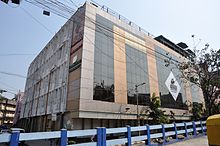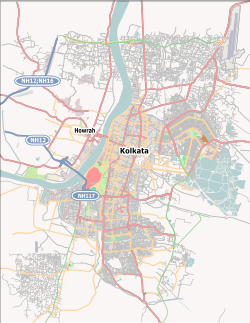This article needs additional citations for verification. (March 2018) |
Dhakuria | |
|---|---|
| Coordinates: 22°30′37″N 88°22′16″E / 22.5104°N 88.3711°E | |
| Country | |
| State | West Bengal |
| City | Kolkata |
| District | Kolkata[1][2][3] |
| Kolkata Suburban Railway | Dhakuria railway station |
| Metro Station | Kalighat, Rabindra Sarobar, Hemanta Mukherjee and Kavi Sukanta |
| Municipal Corporation | Kolkata Municipal Corporation |
| KMC wards | 90, 91, 92, 93 |
| Time zone | UTC+5:30 (IST) |
| Area code | +91 33 |
| Lok Sabha constituency | Kolkata Dakshin |
| Vidhan Sabha constituency | Rashbehari, Kasba |
Dhakuria is a neighborhood of Kolkata (Calcutta) in West Bengal, India. It is located in the southern part of the city and is surrounded by Ballygunge and Kasba in the north, Haltu in the east, Jadavpur/ Garia in the south and Lake Gardens/ Jodhpur Park in the west. Dhakuria has emerged as a notable neighborhood in South Kolkata, characterized by significant urban development. The area has seen substantial growth in recent years, marked by:
Commercial expansion: Various businesses and retail establishments have been established in the locality. Residential growth: The construction of new housing complexes and apartments has increased the residential capacity of the area.
This combination of commercial and residential development has contributed to Dhakuria's rising prominence within the southern part of Kolkata, transforming it into a key urban center in the region.
It has a Postal Index Number (PIN) code of 700031. Some localities adjacent to Golpark and Jodhpur Park also have Postal Index Number (PIN) code of 700029 and 700068 respectively.
Prominent landmarks include Dhakuria railway station, bus terminal # 37, Manipal Hospital, Dhakuria and Dakshinapan Shopping Complex.

History
[edit]The history of Dhakuria stretches back to the early 1800s. Even after large scale modernization in the last few decades, there are several buildings that still exist today that predate 1900.
The rapid population growth of Dhakuria, similar to rest of the City of Kolkata, can be traced back to the late fifties. At the time the southern city limits were up to Ballygunge Lake areas (now known as Golpark). By the early sixties, the neighbouring locality Jodhpur Park had also become an attractive spot for several upscale single-family residential home development projects.
The areas beyond the Eastern railway tracks at Golpark started developing with large numbers of people settling in. The area was very different from the neighbouring Ballygunge. While Ballygunge dotted the homes of the rich, wide tree-lined roads (at Golpark, Southern Avenue), Dhakuria was marked with comparatively narrow lanes and bylanes. The nomenclature of most of the sub localities of this area bears the mark of age-old family dominances viz. Roypara, Bannerjeepara, Daspara, Ghoshpara, Mukherjeepara, Biswaspara, Naskarpara etc. The Pakrashi's were amongst the first few families who came and started residing here (the early 1820s). The Dhakuria Kalibari was also founded by the Pakrashi family.
After the introduction of Dakshinapan, a multi-storied shopping mall and one of the first of its kind in Kolkata, (at the west boundary of Dhakuria in the early 80s), the area started getting an upmarket look.[4] Since then, Dhakuria's population is swelling with well-educated, middle-class people because of its schools, low crime rate and proximity to other important locations. Four Kolkata Municipal Corporation (KMC) wards are spread all over Dhakuria (Wards 90, 91, 92 and 93). Dhakuria is currently under the Rashbehari Assembly and Kasba Assembly Territory. Both Assembly Territories are under Kolkata Dakshin Parliamentary Constituency.
Transportation
[edit]Dhakuria is well-connected to other parts of Kolkata through various modes of public transportation.
Metro
[edit]The area is in proximity to several metro stations on the Kolkata Metro Line, Blue and Orange :
- Kalighat metro Station( Blue Line )
- Rabindra Sarobar Metro Station( Blue Line)
- Tollygunge Metro Station ( Blue Line )
- Kavi Sukanta Metro Station ( Orange Line )
Railway
[edit]Dhakuria railway station is a significant stop on two important suburban rail lines:
- Sealdah–Diamond Harbour line
- Sealdah–Namkhana line
Roads
[edit]The locality benefits from its proximity to major thoroughfares:
- Gariahat Main Road
- Eastern Metropolitan Bypass
- Prince Anwar Shah Road
Auto-rickshaws
[edit]Several auto-rickshaw routes serve Dhakuria, providing connectivity to neighboring areas such as:
- Kasba
- Garia
- Golpark
This network of transportation options ensures that Dhakuria remains easily accessible from various parts of the city.
Infrastructure
[edit]Dhakuria offers a range of facilities to its residents, including:
Healthcare
[edit]- Manipal Hospital, Dhakuria
- EEDF Hospital, Jodhpur Park
- Ashoka Nursing Home
Education
[edit]- Jodhpur Park Boys School
- The Modern Academy
- Lake Point School
- Paresh Nath Balika Vidyalaya
- Carmel Convent School
- St. Andrews School
- Binodini Girls School
- Ramchandra School
Recreation
[edit]- Anderson Club
- Dhakuria Club
- Dhakuria Swimming pool
- Dhauria Public Library


Commercial and Cultural Facilities
[edit]Shopping
[edit]Dakhinapan Shopping Complex is a prominent retail center in Dhakuria, serving as a major commercial hub for the area.
Cultural Venues
[edit]Madhusudan Mancha, an auditorium located in close proximity to Dakhinapan Shopping Complex, provides a space for cultural events and performances.
Dining
[edit]Dhakuria features numerous dining establishments. Notable among these is Tandoor Park, which has gained popularity as one of the area's most well-known restaurants.
Dhakuria Bus Stand
[edit]Dhakuria bus stand has evolved into a popular hangout zone for the locals. The area is bustling with a lively crowd and features various food trucks and stalls.

Culture
[edit]Cultural Activities
[edit]The neighborhood is characterized by a rich cultural environment, with residents actively participating in various artistic pursuits:
Literature
[edit]Dhakuria has a strong literary tradition, with many residents engaging in writing and literary discussions. The presence of writers like Suchitra Bhattacharya has contributed to the area's reputation as a hub for Bengali literature.
Music
[edit]The musical heritage of Dhakuria is significant, influenced by residents such as Purna Das Baul. The area has been a nurturing ground for both classical and folk music traditions.
Poetry
[edit]Poetry recitation and composition are popular activities among the residents, contributing to the area's vibrant cultural scene.
Intellectual Atmosphere
[edit]The concentration of well-educated residents has fostered an intellectual atmosphere in Dhakuria. This environment has likely contributed to the area's cultural vibrancy and its ability to produce and attract notable personalities in various fields. The cultural significance of Dhakuria is deeply rooted in its residents' active participation in arts and literature, as well as the legacy of the notable personalities who have called this neighborhood home. This rich cultural background continues to influence the area's character and its contribution to Kolkata's broader cultural landscape.
Famous people from Dhakuria
[edit]- Pritish Chakraborty eminent Bollywood Actor, Producer, Director, Singer, Writer
- Suchitra Bhattacharya, eminent writer.
- chuni Goswami, footballer
- Dr.Firoz Khan, doctor.
- Purna Das Baul Samrat, Musician
- Sandhya Mukherjee , Musician
See also
[edit]References
[edit]- ^ "Kolkata South district".
- ^ "South 24 Parganas district".
- ^ "Elector Details As On 30-10-2010" (PDF). Archived from the original (PDF) on 29 May 2013.
- ^ "Dakshinapan Shopping Complex".
External links
[edit]![]() Kolkata/South travel guide from Wikivoyage
Kolkata/South travel guide from Wikivoyage
